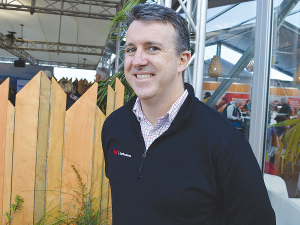Fonterra Suppliers Confident in Mainland Dairy Future
Fonterra's 460 milk suppliers in Australia, who will switch to Lactalis end of this month, are unfazed with the impending change.
 Nathan Penny believes rampant dairy prices may force Fonterra to cap its farm-gate milk price for this season.
Nathan Penny believes rampant dairy prices may force Fonterra to cap its farm-gate milk price for this season.
With dairy prices on the rise, how far can Fonterra go with its forecast milk price rises this season?
Fonterra has a substantial consumer business and raw milk is the highest input cost for value added products. A soaring milk price means it can either cap the milk price it pays to farmer suppliers or pass the extra costs for products like cheese, specialty milks and butter to consumers.
Westpac senior agri economist Nathan Penny believes rampant dairy prices may force Fonterra to cap its farm-gate milk price for this season.
He believes an $8.50/kgMS milk price is getting towards the upper limit of what Fonterra can pay.
"In that sense, Fonterra could cap the milk price to prevent losses in these other businesses," he says.
However, Jarden head of derivatives, Mike McIntyre, points out that other commodity prices like wheat and crude oil are also rising. He thinks Fonterra may be forced to pass on the costs to consumers.
"If commodity prices go up, the end product will cost more. We are already seeing prices going up in supermarkets," he told Rural News.
Penny also points out that Fonterra has limited processing capacity for its various products.
"In 2013/14 for example, we saw that Fonterra was constrained in product mix choices and therefore not fully able to take advantage of very high whole milk powder prices over that season."
Fonterra last month narrowed its forecast farm-gate milk price range to $7.25 to $8.25, with a mid-point of $8/kgMS and issued an earnings guidance of 25-40c/share for its value added business.
Fonterra's director central portfolio management Bruce Turner told Rural News that the co-operative remains comfortable with its earnings guidance.
"While the increase in milk price can put pressure on our input costs, we remain comfortable with our current earnings guidance range of 25-40c/share.
"Regarding processing capacity, as we move through peak milk production months we get more flexibility, which in turn aids product mix decisions," says Turner.
Westpac is forecasting a milk price of $8.50/kgMS for the season; ASB believes the milk price will top $8.75. If achieved, it will surpass the record milk price of $8.40 in 2013-14.
Last week's Global Dairy Trade auction recorded price rises for six of the seven products on offer.
Whole milk powder prices rose 2.7%, its fourth increase in the last five auctions. The jump in prices builds on gains over September and October.
Penny expects that ongoing weakness in global dairy production will continyue to underpin global dairy prices.
New Zealand dairy production over September was down 4% compared to September 2020.
"In addition, anecdotes suggest that this production weakness has continued through October, while dairy production in other key exporting regions is similarly soft," he says.
New Zealand and Chile have signed a new arrangement designed to boost agricultural cooperation and drive sector success.
New DairyNZ research will help farmers mitigate the impacts of heat stress on herds in high-risk regions of the country.
Budou are being picked now in Bridge Pā, the most intense and exciting time of the year for the Greencollar team – and the harvest of the finest eating grapes is weeks earlier than expected.
The Real Estate Institute of New Zealand (REINZ) has released its latest rural property report, providing a detailed view of New Zealand’s rural real estate market for the 12 months ending December 2025.
Rural retailer Farmlands has released it's latest round of half-year results, labeling it as evidence that its five-year strategy is delivering on financial performance and better value for members.
OPINION: "We are back to where we were a year ago," according to a leading banking analyst in the UK, referring to US president Donald Trump's latest imposition of a global 10% tariff on all exports into the US.